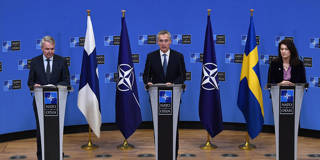Although the outcome of Russia’s war of aggression in Ukraine remains to be seen, it has already fundamentally changed the European security order. For the previously neutral Nordic countries, formal membership in NATO, long viewed as a strategic option for a later date, has become an urgent existential imperative.
STOCKHOLM – While the likely outcome of Vladimir Putin’s war against Ukraine remains unclear, Russia’s aggression has already changed the European security order in important ways. The only modern European historical comparison is Hitler’s invasion of Poland in September 1939. Both cases involved large-scale unprovoked attacks on a neighboring country with the aim of eliminating it. Hitler refused to accept the existence of an independent Poland; Putin refuses to accept the reality of an independent Ukraine.

STOCKHOLM – While the likely outcome of Vladimir Putin’s war against Ukraine remains unclear, Russia’s aggression has already changed the European security order in important ways. The only modern European historical comparison is Hitler’s invasion of Poland in September 1939. Both cases involved large-scale unprovoked attacks on a neighboring country with the aim of eliminating it. Hitler refused to accept the existence of an independent Poland; Putin refuses to accept the reality of an independent Ukraine.